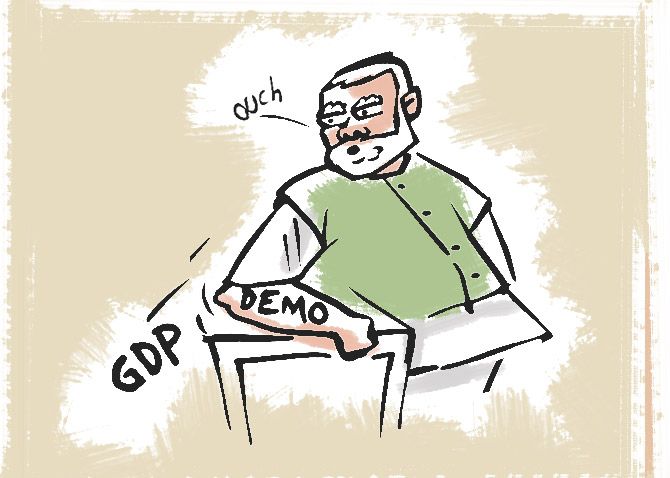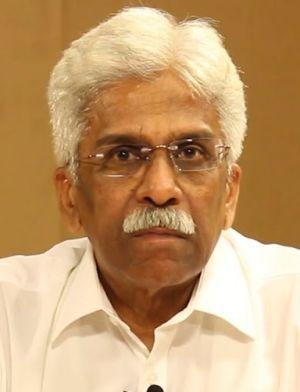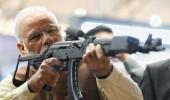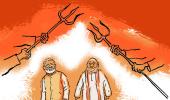'The slowdown is likely to continue.'
Illustration: Dominic Xavier/Rediff.com

Where is India's economy headed?
Will there be a recovery in 2020, or will the decline continue?
Pulapre Balakrishnan -- professor of economics at Ashoka University -- tells Rediff.com's Shobha Warrier, "If the government carries on with its current policies, growth could be less than 5% as we have been slowing consistently!"
What was your reaction to the Budget?
I was astounded by the lack of analysis and lack of clarity in the Budget. It has not addressed any of the concerns of the economy raised by economists and observers in general.
The two major issues raised are the slowdown of the economy and high unemployment rate. And she did not even mention either of them in the Budget.
Do you feel the government is still in denial mode on the slowing down of the economy and also high unemployment?
Absolutely. They are in denial about growth more than unemployment. I see them giving a lot of emphasis on growth, but in denial about the slowing down.
They keep talking about becoming a $5 trillion economy by 2025. But it is clear that the chances of reaching that target are very remote now with slowing growth.
Do you think they have a goal, but the path to reach the goal is not defined properly?
Yes, the path is not defined properly. Even if the path is defined, at the present rate of growth, it is impossible.
The fact is, the economy has been slowing for two years. So, it is very unlikely that the goal will be achieved by 2025.
Was this Budget a lost opportunity for the government as they had a chance to set right the wrongs?
Of course. Some parts of the problem are because of the government's own actions.
The slowing down started immediately after the demonetisation of 2016. So, the government is partly responsible for this.
Yes, this Budget was an opportunity to set right some of their own mistakes in the past.
As an economist, how would you have expected the government to set right the mistakes?
I would say public capital investment or what we call public investment is probably the main way you can respond to the economy right now. Of course, that should be the immediate response.
They should be looking at agriculture in a much more focussed way.
You have to make sure that the irrigation investment actually bear fruit, farmers enjoy extension services, and a part of infrastructure should be built in rural areas. This is what the immediate response should have been.
Yes, there is some increase in capital expenditure in this Budget, but nothing on the scale at which it is necessary at the moment.
The finance minister has announced some projects for rural India. But we have hearing finance minister after finance minister repeating the same things year after year for the last 25, 30 years. I myself have interviewed Dr M S Swaminathan every year, and he used to list what should be done for Indian agriculture.
The fact is nothing has happened even today...
That is true. In some ways, previous governments also did not have very much to show. UPA 2 does not have a particularly distinguished record as far as the economy is concerned.
In fact, the slowdown started during that period. But the Modi government has also contributed to it through demonetisation and rushing through the GST, to some extent.
Demonetisation by far is the bigger culprit in the slowdown story.
Demonetisation, they said was to attack black money, and many people then felt the intention was good. People thought the country would come out of the turmoil soon.
Do you think the government failed in its effort as black money is back in circulation?
In some ways, our estimates of back money are very general and not robust. Now, there has been talks about counterfeit Rs 2,000 notes. In fact, the RBI itself has confirmed it.
The Rs 2,000 note was introduced at the time of demonetisation. The question is, if part of the idea of demonetisation was to end the existing black money in high denomination notes, replacing Rs 500 and Rs 1,000 notes with Rs 2,000 notes was a completely wrong thing to do at that time.
It might have made it easy for people to hoard black money. It was a very big mistake, and demonetisation itself is a very badly designed intervention by this government.
Aggregate growth in the economy declined the very next year after demonetisation.
Capital formation failed in the next quarter; it was in fact, negative.
So, it is not just MSME and agriculture, but also the rest of the economy including the corporate sector that were affected by demonetisation.

Do you feel the government lacks people with knowledge and understanding of the economy to advise it?
Yes, there is a dearth of people of knowledge and people of independent bend of mind.
Having said that, ever since 1991, various governments have relied excessively on economists from the World Bank and the IMF.
Yes, it is important to have people from the World Bank and IMF, but you can't have them formulating policies. I think that was where the problem arises.
You need to have a much wider spectrum of economists to advise you. There has been a history in India of consulting a wide range of economists, but this government is notable for its lack of intellectual heft.
Votaries of swadeshi say earlier governments relied too much on economists from abroad who lack an understanding of the real India...
But this government also has consistently appointed economists from abroad. They have actively gone out and sought people with not just experience abroad but their entire career overseas.
Why have the problems in the economy not been tackled properly?
Governments hire economists who are likely to agree with their point of view who are in complete agreement with them. Governments do not hire economists who have an independent outlook. All governments are like that. This government is no exception.
The way e-commerce companies are dealt with, do you get the feeling that this government is moving towards protectionism?
To some extent, yes. It is more apparent in the tariffs they have now slapped on footwear, furniture, etc. That, I guess, is a more direct evidence of their kind of swadeshi or knee jerk response to the situation.
Chinese President Xi Jinping said the new normal for China's growth will be 7% and not 10% at which they were growing consistently. What do you think India's new normal will be?
Good point! If the government carries on with its current policies, it could even be less than 5% as we have been slowing consistently!
Various economists -- including Nobel Laureate Abhijit Banerjee -- feel India gives too much importance to GDP growth. They feel India should instead concentrate more on per capita income. What's your opinion on this?
GDP growth, to some extent, will affect per capita income. Per capita income is GDP per capita.
Yes, instead of saying GDP growth rate, you should be concentrating on unemployment rate, state of agricultural growth, etc.
I would say, you should look at the employment rate, not just inflation rate and GDP growth.
The criticism now is that the government is concentrating more on political and social issues rather than the economy?
Absolutely. The government is focusing only on divisive social issues as they have a socio-cultural agenda.
They are trying to implement them without doing anything about the declining economy and completely neglecting the impact of this divisiveness on investment needed for future growth.
When investors see uncertainty and ruptured social fabric, they are likely to hold investment back. So, the social policies are not only not addressing economic problems, but worsening it seriously.
Are we heading towards a crisis, or are we in crisis now?
Unemployment rate at the highest in 45 years certainly suggests we are in a crisis now.
What kind of a year do you foresee?
I don't see a reversal of the decline in growth. The slowdown is likely to continue.










